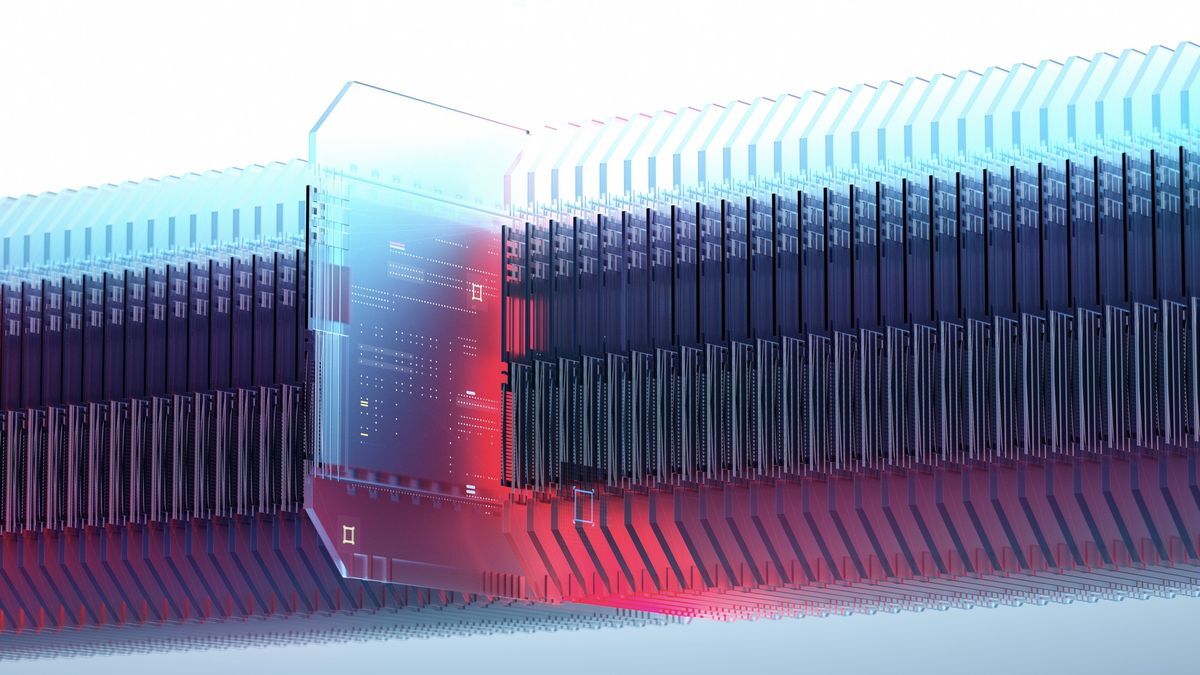Video of ceramic storage system prototype surfaces online — 10,000TB cartridges bombarded with laser rays could become mainstream by 2030, making slow hard drives and tapes obsolete::Ceramics-based storage medium consumes very little energy and lasts more than 5,000 years, creators say
I thought latency was measured in seconds for these?
At 10,000tb, it could have a latency of 5 minutes and it’d probably still be useful for long term storage.
Edit: it’s also useful to note that it sounds like these are write-once, read many. That means for consumers, they might eventually replace Blurays, but they probably won’t be replacing your hard drive.
Depending on price, consumers may be able to afford multiples. They could in theory use them until no space remains. This would be be fine for any data storage that people want, but obvious wouldn’t be good as your c drive.
Also, if they can truly be manufactured on the cheap, it could be a good backup system for anyone with a digital collection of photos / movies / etc. My photo collection doesn’t change much but takes up a decent amount of space. If I could buy one of these a year, dump a bunch of photos, then bury it in the yard (or whatever) for the event of a drive failure. I’d be cool with that - something sturdy enough to take some abuse as a backup drive with a long memory and low failure rate.
I’m sure the plates are reasonable but are you going to be sticking a electron microscope in your office…?
We’re talking about equipment that’s hundreds of thousands or millions of dollars in order to write and read from these plates.
I get your point, but the consumer version may not need to be as complex as an electron microscope. Additionally, there will be much more demand for these than electron microscopes. I’m speculating here, but both of these factors together could reduce the price significantly.
10k TB would be enough to backup all my data hundreds of times over. If I made a cold copy every 3 months of everything, even accounting for increasing data over time, I’d probably die before making it through a single one.
Yeah that would be the only useful use case. However I think with even a few seconds of latency I could deal with that for things like video playback since it would quite literally up my storage by a few orders of magnitude.
Yeah it wasn’t so long ago that hard drive storage was more expensive than spindles of CD-Rs and that was around the time that internet and torrenting were taking off. People used to burn CDs full of movies to share and make room to download more. In that use case a unit of 700 MB on write once read many storage was useful if cheap.
deleted by creator
People who need to archive a shitload of data without reading often, or ever.
Never underestimate the bandwidth of a station wagon full of tapes hurtling down the highway
Normal people don’t, but when you get into absolutely massive enterprise archiving there’s no rival for the density and cost effectiveness. It sucks for general purpose storage, but for write once, hopefully never read use, they’re ideal.
I know it’s been said already, but actually a ton of off-site backup services operate exclusively on tape. It’s significantly cheaper and more reliable for cold storage solutions.
Everyone, for cold storage. There’s no cheaper, denser and more reliable option available.
Tapes are a great archival medium, they have a very low cost per gb, and are able to be stored for decades. The only comparable medium is CD and other optical media like Blu-ray.
Hard drives have an expected life span of only around 5 years due to the moving parts, and while flash storage lasts about 10 years.
Wow, more amazing technology I can’t wait to never hear about again…
Ceramic drives have been in the news for a few years now. They have been edging towards commercial availability for a while. It might take a while until they become available to consumers like yourself, but it’s not like nothing is happening.
Holographic storage has been around for about 20 years now. Where’s my holographic drive?
Looks like you saw right through the marketing. Seems like that product failed to materialize. It fairs to reason those claims were intangible.
Would be huge for Bitcoin. We could x1000 the number of transactions per second
Edit: If you are mad please don’t just downvote and explain why you disagree
I didn’t downvoted you as i sympathise with you but i can explain, people hate cryptobros and crypto with them, because cryptobros showed themselves as major pieces of shit in previous mining boom, of course i know that normal miners that was mining before mining boom is ok people, that’s why i said i sympathise with you, but mining boom attracted alot of scammers con artists and pieces of shite, and that’s the way your everyday Joe percieves them now, basically small amount of shits made all of the reputation and hate crypto have now, and when someone shows with crypto proposals now people starting to have Vietnam flashbacks of 2020 mining boom with clowns and circuses
Something I sometimes think about is how much of humanity’s history is just like, gone. Completely forgotten to time. Great works of art that’ll never be seen. Amazing compositions that’ll never again be heard. An uncalculable number of lifetimes reduced to nothing more than food for the dirt.
The proposition that we could store vast amounts of our current experience on archival slabs and preserve it all far into our distant future is incredibly exciting to me. It wouldn’t only allow us to indefinitely preserve all of these incredible works of art our modern world has enabled. But would also allow us to more effectively learn from our collective societal mistakes. It would hopefully be more difficult to ignore our past foibles when we keep such detailed receipts… Hopefully.
If not at least they’ll have SpongeBob in 7023 to distract from the cyber-nazis.
Yeah but in about 10 years it will be replaced by something even better and they’ll stop making the readers for it.
The proposition that we could store vast amounts of our current experience on archival slabs and preserve it all far into our distant future is incredibly exciting to me.
We’re currently one Carrington Event away from losing a huge amount of the history of the last 20 years. Not to mention all of the things from previous years that were archived from originals that no longer exist.
My apologies to the set designers of The Donnager/Rocinante on The Expanse, for when I said “Ugh, not the glass tile future computer trope again.”
Look if you can trade a little over a hundred isolinear processing chips for a goddamn space cannon it’s gotta be worth it
I’m pretty sure that trope is 100% about being able to use the actors’ faces while they’re doing computer stuff. Same as why space suits always have lights inside the helmets, which would be an insanely bad idea IRL.
Finally something that could hold my entire porn collection.
I don’t think consumer use is even on Cerabyte’s roadmap. They are proposing rack-mounted units for datacenters, and the roadmap includes upgrading from lasers to electron microscopes for higher density in the future. The media are super dense but the equipment to read and write that media is large and complex.
There was some discussion on this a few months back in this thread, as well: https://lemmy.world/post/4695105
As I noted in that other thread, they were set to present at the Storage Developer Conference in October. Looks like the video of their presentation is available now. I have not yet watched it. https://storagedeveloper.org/events/agenda/session/527
Edit: Looking through their presentation PDF, they refer to access times from 10 seconds to 90 seconds. That’s whole seconds, no milli, micro, or nano. More a substitute for archival tapes than hard drives or SSDs. They don’t seem to address any use case besides cold storage. I’m not saying that to dismiss or criticize the tech, just to point out that the linked article seems to be off target in its analysis, particularly in the headline.
This should be the top comment.
Thermal variations over time: Hold my beer.
deleted by creator
I know it was said before in previous decades as storage evolved, but: How the fuck, do you eve fill these up?
Just wait. Triple AAA devs will find a way to make their code even less optimal so that way the latest call of duty or NBA games will be 5tb in size while also receiving 5tb updates every other day to fix bugs and add paywalled content and gambli- I mean loot boxes.
Porn
Porn
Call of Duty updates
I like to think of them as IPv6 addresses. You just don’t.
Why would they be harder to fill up in the evening? /s
Data hoarders will love it if it’s cheaper than current storage methods. How much would you need to pay for 10PB right now?
The storage plates probably won’t cost much, but the capabilities it uses to write to those plates looks extremely expensive and won’t be fitting into your computer tower any time soon.
“Any time soon” is the thing. Look at the history of hard disk drives. To store 3.75MB in 1957 on a hard disk, a single hard disk was the size of two refrigerators. By the 1980s they were 8 inches (~20cm) big stored 10 MB. Nowadays they are 3.5 inches (~9 cm) big and can store multiple TB.
Technology has accelerated considerably. Even if it takes 20 years, it might still be quicker than the hard disk to home timeline.
Yes, but there’s different problems at hand now. 60 years ago the entire driving force in computers consisted of making things smaller. A hard drive 50 years ago worked like a hard drive from 20 years ago. Just shrunk. Same for processors.
Well now we’re running out of room to shrink. We had to change hard drives completely. Processors started going multi core, and in the case of these ceramic drives: lasers can’t get much smaller and stay powerful enough to write, and magnifying lenses also can’t keep shrinking.
Aside from that, this tech is all physical, which means noise, and no one wants to go back to hearing noisy hard drives again. Lol
I have been waiting for the results of project silica for awhile. The fact there are potential alternatives is very exciting to hear. The hoard is not getting any smaller.
Interesting.
How many write-erase cycles can be done?
I don’t think this is rewritable storage, this looks to be permanent forever storage. So you wouldn’t put this in a regular computer.
0, it’s write once read anytime you feel brave enough to dig through 10000TB of data.
Still useful as archive storage I guess.
For some use cases, sure. Personally I can’t remember when was the last time I reached for old backups to dig something up.
*arr stack would disagree with you, storage of this tech and os on ssd would make quite good self hosted streaming platform
Then a court comes and orders some deletion … :-)
Removal is probably possible by just burning trash over real data. But identifying what needs to be burned. Ouch.
To all the naysayers: if the claims hold up this will be super useful for some industries. Example, I worked at a human genomics lab for diagnostics. By law we were supposed to retain raw data for a whopping 120 years. With a couple terabyte per individual for a WGS, the storage and backup costs were very much non-trivial.
Yeah genomics research has this white elephant problem where the data retention for open science/publication is incredibly expensive for the ones doing the research.
As a data analyst at mid-large corporation in America: please stop emailing me that the servers are nearly full. I need to store all of this to stay within regulations and you only give me one place to put my data outputs :(
As a regular computer user: please stop telling me my OneDrive is full, I don’t even use it, I have no idea how it filled up
Just wait until one of your techs drops a cassette of these glass and ceramic plates and suddenly your company is out 100,000TB of data.
The whole “it can last 5000 years” thing is somewhat ridiculous considering the library mechanisms, carriers for the slides and basically everything else not glass and ceramic probably won’t last more than 20 or 30.
They have a video on their channel showing them bending and twisting the material.
But ceramic plates can probably be put into a working enclosure to get the data from it again
Just like how if you put a shattered CD in an apparatus, you can still use a laser reader to recover any data on the undamaged sections.
Though, because data is recorded in a circular pattern at high speeds, you won’t get much. Or what you get will have lots of corruption. I wonder what pattern of storage these plates use? If it’s similar to SSDs, then large files can be nested in a very small area of space - increasing the chances of recovery.
It is possible to make glass and ceramics that are resistant to shattering from fair hard impacts. I don’t know if that can be employed here, but there are other ways to deal with the problem.
Additionally, if 100,000 TB is something that people can carry by hand, then it is also possible to back up those drives relatively easily (relative to that technology).
Lastly, current silicon fabs have boxes of wafers that at the final stages can exceed $1M in the retail value. They have robots that handle those. If the 100,000 TB is worth something close to that, then a human will not be carrying it.
You’re not playing Lemmy correctly. The highest rated post must always be a half-hearted pessimistic lazy criticism of whatever new technology is being described.
Or just put the cartridge in a shockproof box. One that can last as long as the medium. It can’t be that hard to make a really good box.
then a Han Wo to be carrying it.
Who dat
possible to make glass and ceramics that are resistant to shattering from fair hard impacts.
As far as I know, there is 1 storage technology that has survived wars. Paper.
Yes, but paper isn’t information dense and is highly susceptible to even the smallest amount of moisture in the air.
Paper is notoriously easy to destroy in conflicts
Say that to the library of Alexandria.
There’s another, better one: stone carvings.
Lastly, current silicon fabs have boxes of wafers that at the final stages can exceed $1M in the retail value. They have robots that handle those. If the 100,000 TB is worth something close to that, then a human will not be carrying it.
Pharma has entered the chat…they just have warehouse people riding forklifts with pallets worth much more than $1M.
Isn’t that a concern with other tech too? If storage is cheaper, it would enable for more redundant copies
A lot of places just don’t have backups. I’m thinking of hospitals getting hit with ransomware attacks, some are fine and just pull from backups and others shell out lots of money.
I’d love to see cheaper enterprise storage since it’ll be easier to justify more backups. That single IT guy managing a hospital network could use a break…
That’s… literally always a concern. Name a digital storage medium impervious to impact damage. You can’t.
Having backups at multiple sites is industry standard. Nobody is keeping 100,000TB of data in a single location.
As for your second point, I don’t see the relevance. You can store the glass wherever you want, the other mechanisms aren’t relevant for keeping the stored data.
























